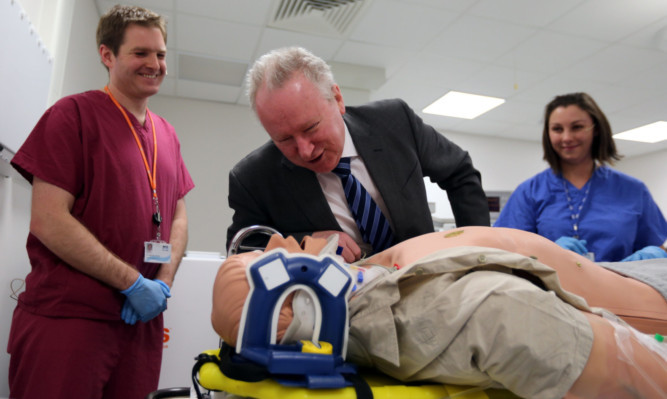Scottish mum-of-three Ann Fisher is battling a form of cancer for which she could be treated in England and Wales.
However, the 50-year-old is unable to access the appropriate medication north of the border and consultation on making drugs that could save her life available won’t take place till it is “too late”, it has been claimed.
Ann’s case was raised at the Scottish Parliament, as Labour leader Johann Lamont accused the First Minister of planning an “independence ball” while cancer patients have to go without treatment.
Ms Lamont called on Alex Salmond to “start addressing the real needs of Scots rather than his own game of let’s pretend”, a reference to plans published this week detailing preparations for an “independence day” in the event of a Yes vote.
“If she (Ms Fisher) lived in England, she would be receiving drugs that could prolong her life,” she said. “However, because she lives in Scotland she does not get that treatment. The Government’s delayed drugs review will be too late for Ann. Her case, sadly, is not an isolated one.”
Ms Lamont added: “Whatever the First Minister is doing, what he certainly isn’t doing is addressing the real needs of Scots.
“He’d rather play games of imagining where he might be in three years’ time than face the reality of today.”
Mr Salmond replied that Labour agreed with the decision not to set up a special cancer drugs fund to pay for treatments.
He said: “We’re trying to find the best system which allows our people to have access to the best possible treatment. But the idea these issues are easy to deal with is extraordinary.”
After the debate, Ms Fisher called the First Minister “blase”, adding: “I just hope someone is listening and that they are able to make this drug available to people like me.”
Meanwhile, Health Secretary Alex Neil was rebuked during FMQs for sitting on a patient’s bed during a visit to a new hospital designed to minimise superbugs.
Mr Neil opened the Royal Victoria Building in Edinburgh on Tuesday and breached NHS guidelines by sitting on a patient’s bed.
A Scottish Government spokeswoman said Mr Neil spotted his error immediately, and the sheets were quickly changed.
Cases of superbug MRSA have been reduced by 81.5% in the last seven years, from 1,002 cases in 2005 to 185 last year.
Conservative deputy leader Jackson Carlaw, the party’s health spokesman, praised the Government’s record. But he added: “Would he (the First Minister) respond to the following that I received this morning: ‘As a nurse, I was rather disgusted to see the Scottish health minister park his backside on a patient’s bed . . . and wittering on about infection control.’”
Mr Salmond said: “It’s true that one of the successes has been to instil changed behaviour on the part of patients, visitors, and staff through the NHS, and that includes Government ministers. In future, every single one of us should aspire to the high standards of Jackson Carlaw.”
